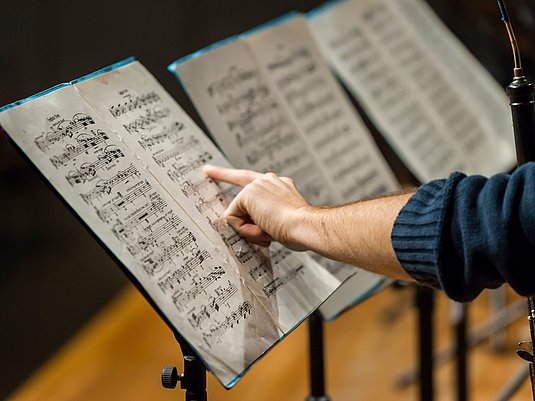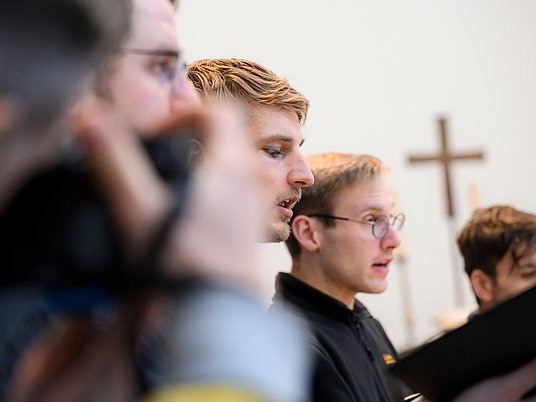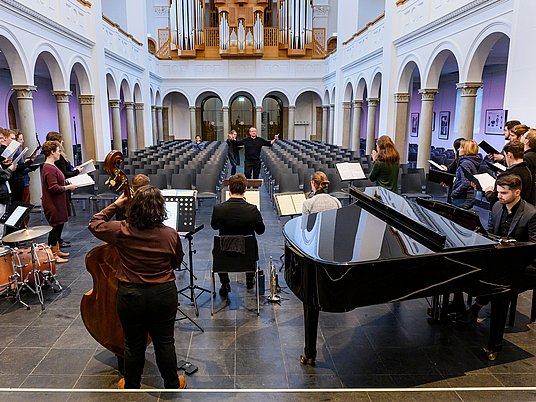Bachelor of Music -
Catholic Church Music
Study with corners and cantatas.
The Bachelor of Music Catholic Church Music program comprehensively prepares students for the diverse requirements of the profession of church musician. The focus is on instruction in choral and orchestral conducting, artistic and liturgical organ playing, as well as piano and voice. In addition, music-historical, -theoretical and theological subjects are taught. The program develops the artistic personality and provides comprehensive skills in the various areas of ensemble conducting and organ playing. In addition, extensive instrumental and vocal skills are taught and a broad background knowledge of theology, music theory and musicology is acquired.
If you have any questions about the program, please contact the appropriate contact person(s).
Basic information
| Degree | Bachelor of Music |
|---|---|
| Period of study | 8 Semester |
| Course begin | Sommer- und Wintersemester |
| ECTS points | 240 Credits |
| Continuing study options | Master of Music Church Music (Catholic) |
Special features of the study
The program is characterized by its high number of subjects prescribed by the Church, which means that the program has a strong interdisciplinary orientation from the outset.
Application and aptitude test
Applications are submitted online via the muvac platform. All information on the procedure can be found on our application page.
Admission requirements
- General university entrance qualification or a comparable university entrance qualification
- Proof of a TestDaF 3 language certificate for non-German-speaking applicants
- Successfully passed aptitude test
Qualifying examination
The aptitude test takes place in two parts.
- Artistic-practical examination in the subjects choral conducting, singing and speaking, organ literature, organ improvisation and piano ( duration in total approx. 60 minutes)
- Written (duration: 60 minutes) and oral (duration: approx. 15 minutes) examination in the subject of aural training.
Detailed information can be found in the Qualifying Examination Regulations, especially in the appendix for content requirements and conduct of the examination. Application for the course can be made for the winter semester as well as for the summer semester. The application deadline is either 01.03. (winter semester) or 01.10. (summer semester) each year.
Course of studies and examination regulations
The program is divided into a basic study period (1st and 2nd year) with a high proportion of compulsory modules and a differentiated main study period (3rd and 4th year). The seven main modules form the structural framework in the interdisciplinary network:
- Core module
- Artistic-practical context
- Education
- Mediation
- Professionalization
- Bachelor thesis / Interdisciplinary project
- Supplement
Instruments
The following organs are used in the college for practice and lessons:
- Klais/Thomas III/47
- Schuke - III/38
- Ahrend - II/19
- Cavaille Coll/Mutin - II/12
- Eule - III/6 (various alternating loops)
- Rohlf - II/5
Outside the university there are possibilities to use various instruments of the diverse Cologne church landscape. In particular:
- St. Kunibert, Kuhn - III/42
- Trinitatiskirche, Klais - III/44, inauguration January 2010
- Cathedral, Klais - IV/89 and III/53 (students of the university play regularly at the weekday noon prayers in the cathedral)

Contact
|
winfried.boenig@hfmt-koeln.de |
|
| Address |
Hochschule für Musik und Tanz Köln Unter Krahnenbäumen 87 50668 Köln |

